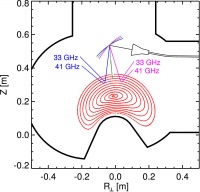TJ-II:Reflectometry: Difference between revisions
mNo edit summary |
mNo edit summary |
||
| Line 19: | Line 19: | ||
[[File:DRscheme.jpg|200px|thumb|right|Schematic drawing of the Doppler Reflectometer System of TJ-II.]] | [[File:DRscheme.jpg|200px|thumb|right|Schematic drawing of the Doppler Reflectometer System of TJ-II.]] | ||
Since February 2009, the frequency hopping system is in operation in oblique incidence (''Doppler'' reflectometry, [[TJ-II:Sectors|sector]] C6) <ref>[http://link.aip.org/link/?RSINAK/80/073502/1 T. Happel, T. Estrada, E. Blanco, V. Tribaldos, A. Cappa, and A. Bustos, Rev. Sci. Instrum. '''80''' (2009) 073502]</ref>, measuring plasma density fluctuation velocities and their wave number spectra. The system is able to measure in a radial range of about ρ = 0.6 - 0.9 (ρ = r/a is the effective plasma radius) and the perpendicular wavenumber can be selected between 3 and 15 cm<sup>-1</sup>. | Since February 2009, the frequency hopping system is in operation in oblique incidence (''Doppler'' reflectometry, [[TJ-II:Sectors|sector]] C6) <ref>[http://link.aip.org/link/?RSINAK/80/073502/1 T. Happel, T. Estrada, E. Blanco, V. Tribaldos, A. Cappa, and A. Bustos, Rev. Sci. Instrum. '''80''' (2009) 073502]</ref>, measuring plasma density fluctuation velocities and their wave number spectra. The system is able to measure in a radial range of about ρ = 0.6 - 0.9 (ρ = r/a is the [[effective plasma radius]]) and the perpendicular wavenumber can be selected between 3 and 15 cm<sup>-1</sup>. | ||
The system consists of a circular choked-corrugated antenna | The system consists of a circular choked-corrugated antenna | ||
Revision as of 10:37, 23 July 2009
Profile Reflectometer
TJ-II has an AM reflectometer [1] for measuring electron density profiles with a temporal resolution of 2 ms (located between sectors A4 and A5).
Fluctuation Reflectometer
A fast frequency hopping reflectometer [2] working in the Q-band (33 - 50 GHz) was used from 2004 - 2008 in sector B8 in perpendicular incidence (conventional reflectometry). The system allowed studies of the velocity shear layer in TJ-II [3] and of the radial position of its origin. [4]
Doppler Reflectometer
Since February 2009, the frequency hopping system is in operation in oblique incidence (Doppler reflectometry, sector C6) [5], measuring plasma density fluctuation velocities and their wave number spectra. The system is able to measure in a radial range of about ρ = 0.6 - 0.9 (ρ = r/a is the effective plasma radius) and the perpendicular wavenumber can be selected between 3 and 15 cm-1.
The system consists of a circular choked-corrugated antenna [6] (fabricated by the Antenna Group of the Public University of Navarra, Spain) which emits a microwave beam with a gaussian electric field distribution. The beam is reflected by a steerable ellipsoidal mirror to the plasma. The mirror serves for two purposes: 1) focus the microwave beam to the region where backscattering takes place and 2) change the angle of incidence between beam and plasma, giving the possibility to select the turbulence scale to be measured.
References
- ↑ T. Estrada et al., Plasma Phys. Control. Fusion 43 (2001) 1535–1545
- ↑ L. Cupido, J. Sánchez and T. Estrada, Rev. Sci. Intrum. 75 (2004) 3865
- ↑ T. Estrada, E. Blanco, L. Cupido, M.E. Manso, and J. Sánchez, Nucl. Fusion 46 (2006) S792–S798
- ↑ T. Happel, T. Estrada, and C. Hidalgo, Europhys. Lett. 84 (2008) 65001
- ↑ T. Happel, T. Estrada, E. Blanco, V. Tribaldos, A. Cappa, and A. Bustos, Rev. Sci. Instrum. 80 (2009) 073502
- ↑ J. Teniente, R. Gonzalo, and C. del-Rio, IEEE Antennas Wireless Propag. Lett. 5 (2006) 380
